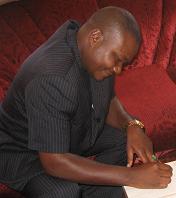 The primary school I attended in Nigeria was built during the colonial era. It is an eight block structure. Two were actually built during the colonial era while the other four were built in the post colonial era, precisely in the seventies and eighties.
The primary school I attended in Nigeria was built during the colonial era. It is an eight block structure. Two were actually built during the colonial era while the other four were built in the post colonial era, precisely in the seventies and eighties.There is no doubt that we lack a maintenance culture in Nigeria. For unpatriotic Nigerians however, the lack of maintenance culture is either deliberate or encouraged as it serves their purpose. The structures have continued to wear away as a result of the lack of maintenance. Those built during the colonial era have been able to stand wear and tear for a longer period of time since they were built with a deliberate aim of ensuring they lasted for a longer period. No matter how strong a building is, it will eventually begin to wear out however. That is what is happening to even the colonial blocks of my primary school presently.
Of these eight blocks only three are adequate enough for the population of the school thereby confirming the suspicion that the classroom blocks are built primarily to get some people rich.
In Nigeria, it is an open secret that authorities hate maintaining school buildings as it is the only way of ensuring that contracts are awarded for the construction of new ones during which money is made by contractors and the members of the administration awarding the contracts.
The other day as I passed around the school I saw the blown roof top of the most solid structure built with rocks derived from the rocks which are available in my community. It has been like that for the past three years. It then dawned on me that the local authority whose responsibility it is to maintain the structure is determined not to undertake that responsibility.
I decided to see certain prominent persons who went to that school hoping that their show of interest in seeing that the structure is rehabilitated will compel the local government education department to see to it that the building is given the desired attention. On arrival at the house of one such individual I first met with his son who is known to me. I then asked if he could arrange a meeting between me and his dad. He asked if all was well. I answered that I wanted to see the man in my position as a journalist. He told me I have to go and come back some other time to enable him arranged the meeting. I responded by calling his attention to the fact that the man is around and people are seeing him and why not me. I then went ahead to tell him the exact reason why I wanted to see the father by revealing to him the situation of the school. He responded by saying that why the school is like that is that people are only trying to get some money for themselves and doubts if his father who happened to be an ex-security official would want to attend to such an issue. The guy who said this claims to be a graduate of sociology. Seeing that he didn’t have any intention of letting me see the man, I left to the house of a second individual who was also educated in that school. I also met with a son of his who was sweeping the yard when I arrived. I told him to tell the father that I am a journalist. When the man came he asked why I wanted to see him. On hearing the subject of my mission, he simply told me he doesn’t talk to journalist and opened the door for me to find my bearing. He actually banged the door behind me. This is a man who had been the chairman of a local government during his period in the service.









